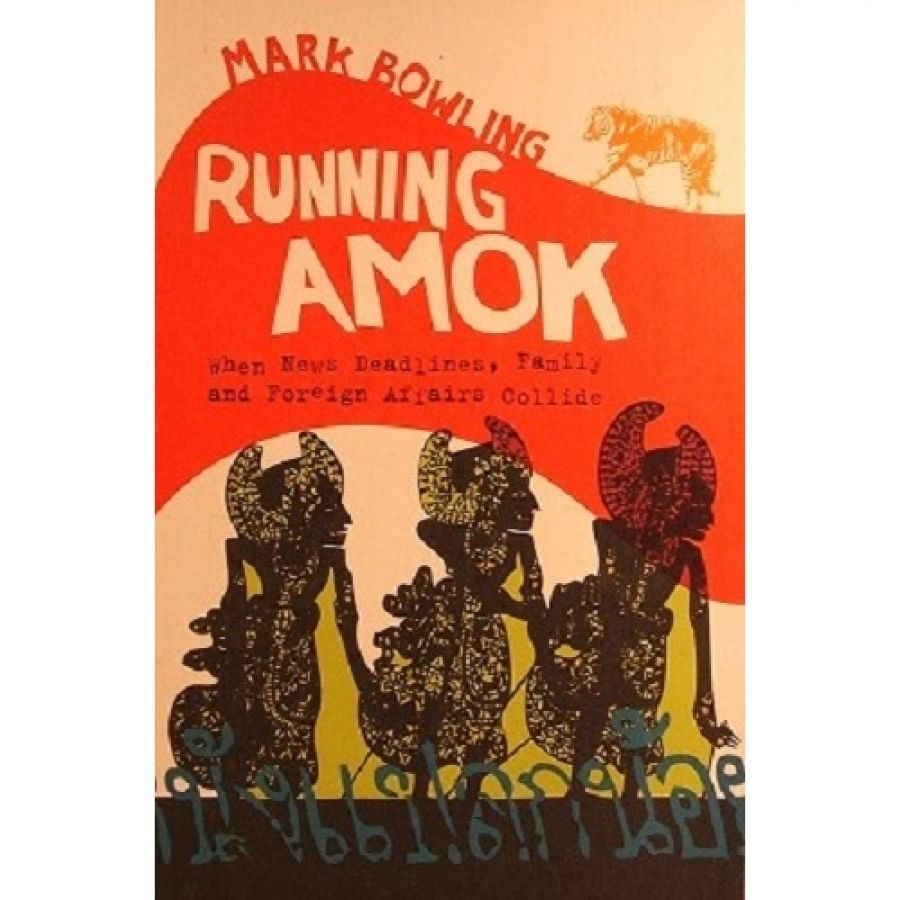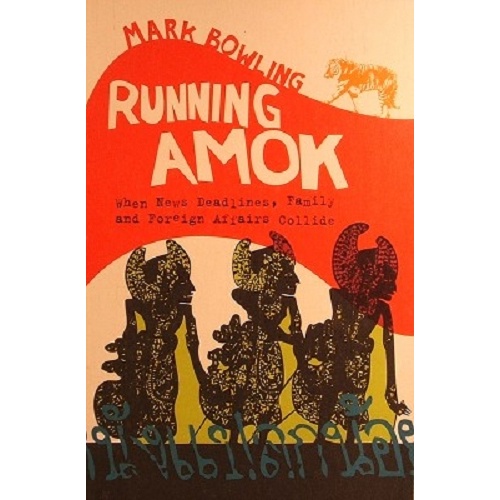
- Free Article: No
- Custom Article Title: Urgent learning
- Review Article: Yes
- Article Title: Urgent learning
- Online Only: No
- Custom Highlight Text:
Mark Bowling was the ABC’s man in Indonesia from 1998 until 2002, and this book is an excellent account of the period of his posting. It covers a turbulent time in Indonesian life from May 1998, the end of the thirty-year Suharto regime, until May 2002, when the newly fledged nation of East Timor spread its wings. An epilogue adds his involvement in reporting on the most significant event in Indonesian affairs for Australians, the Bali bombing on 13 October 2002.
- Book 1 Title: Running Amok
- Book 1 Subtitle: When news deadlines, family and foreign affairs collide
- Book 1 Biblio: Hodder, $32.95 pb, 308 pp, 0733620423
- Book 1 Cover Small (400 x 600):

- Book 1 Cover (800 x 1200):

Despite its being our nearest large neighbour and the most populous Muslim nation on earth, Australians do not know much about Indonesia nor in the past have they seemed particularly curious to extend their knowledge beyond the familiar hotels and beaches of Bali. I suspect that the bombing of the Sari Club and the rise of militant Islam across the world has changed that. Now there is a sense of urgency, fuelled by self-interest, in learning more of what is going on in this archipelago containing more than 217 million people.
Bowling’s book is not a bad place to start for anyone wanting to understand what the conflicts that regularly erupt in Indonesia are all about. During his time there, he visited and reported on the religious tensions between Muslims and Christians in Ambon, the separatist movement in Aceh, and the growing desire for independence in West Papua. Readers will find the accompanying maps of these areas helpful, given our shaky knowledge of Indonesia’s geography.
Running Amok begins with the student riots that accompanied Suharto’s downfall. Bowling paints a fine picture of Suharto’s corrupt régime, and contrasts it with the disgusting poverty endured by the people, including young children who live on Jakarta’s rubbish dump, scavenging noodles as the only means of feeding themselves.
Mark Bowling charts the short and eccentric reign of B.J. Habibie, the subsequent rise of the populist Megawati Sukarnoputri and her surprise defeat at the last minute by the ailing and nearly blind Abdurrahman Wahid, before her eventual ascent to the presidency. Yet the book is not a political history; it is a correspondent’s eye on what was happening, necessarily conflict-driven. Bowling conveys a fine sense of the way a newsman is confined by what constitutes news and the sad truth of the old reporters’ adage ‘if it bleeds it leads’. He is aware that a true picture of Indonesia cannot be told through its conflicts and wars alone, yet for him as a foreign correspondent there is no time for a gentler, more thorough reading of the country. Nor is there time to look at some of the more ominous undercurrents such as the rise of militant Islam and the role of Jemaah Islamiah.
Throughout the book, Bowling reveals a strong sense of feeling for the ordinary people of Indonesia and how little they benefited from the environmental and economic exploitation that passes for development in much of the country. There is a fine chapter dealing with a visit to the Freeport gold and copper mine in West Papua. Despite the fact that billions of dollars were shovelled back to its American shareholders and to the central government in Jakarta, Bowling reports that it was hard to see what the Papuan owners of the land had gained from the mountain of gold. There are excellent accounts of visits to Ambon where Muslims and Christians are locked in a battle for economic and religious supremacy and to the separatist movement in Aceh. They highlight the enormous diversity of the country, the problems involved in holding it all together from Jakarta, and the brutality of the Indonesian military in doing so.
Much of the book is taken up with the East Timor story, the major one of his posting. Bowling travelled there often. He witnessed the horrors of militia violence, was himself attacked, and continued to be impressed by the steadfastness of the East Timorese people, who would not be intimidated in the face of Indonesian military led violence. Bowling was on hand when Xanana Gusmao was released from prison, reported on the referendum on autonomy and its aftermath, and witnessed the arrival of internet and the Independence Day celebrations. There was great optimism in the air. As we know today, much remains to be done to repair the legacy of violence and colonial intimidation.
The life of a foreign correspondent is colourful and exciting. It is also dangerous. Correspondents work extremely hard, as Bowling and other correspondents have attested; you wonder whether the ABC gives them enough support. Bowling attempts to weave his family into the tale. He contrasts the stress and emotional turmoil he suffers from what he sees in the field with the relative calm of home life in Jakarta with his wife and young children. He often feels misunderstood, unable to give what he feels he should, his mind on work. His relationship suffers. He tries hard to balance his work with his responsibilities to his family. It is an eternal story.


Comments powered by CComment